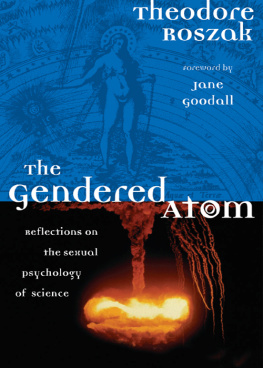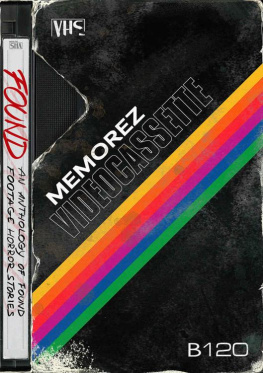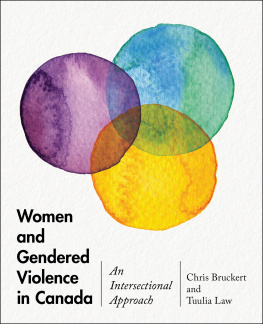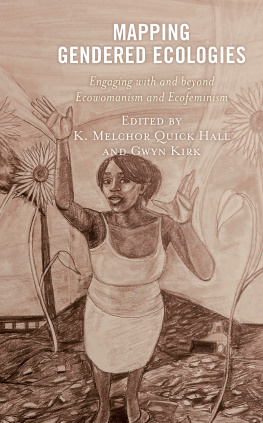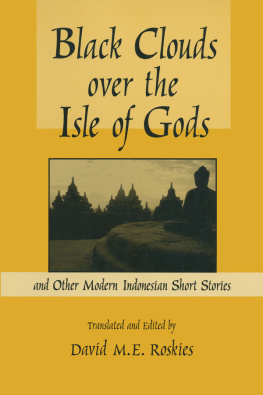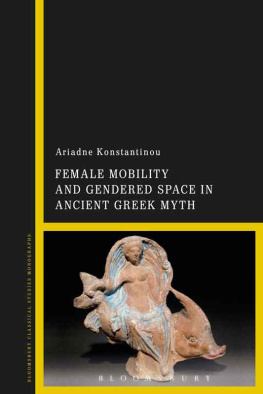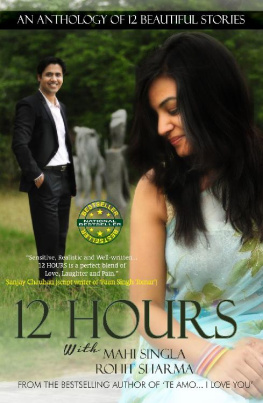Jehanara Wasi - Gendered Space:Anthology of Stories
Here you can read online Jehanara Wasi - Gendered Space:Anthology of Stories full text of the book (entire story) in english for free. Download pdf and epub, get meaning, cover and reviews about this ebook. year: 2000, publisher: Srishti Publ., genre: Art. Description of the work, (preface) as well as reviews are available. Best literature library LitArk.com created for fans of good reading and offers a wide selection of genres:
Romance novel
Science fiction
Adventure
Detective
Science
History
Home and family
Prose
Art
Politics
Computer
Non-fiction
Religion
Business
Children
Humor
Choose a favorite category and find really read worthwhile books. Enjoy immersion in the world of imagination, feel the emotions of the characters or learn something new for yourself, make an fascinating discovery.
- Book:Gendered Space:Anthology of Stories
- Author:
- Publisher:Srishti Publ.
- Genre:
- Year:2000
- Rating:5 / 5
- Favourites:Add to favourites
- Your mark:
- 100
- 1
- 2
- 3
- 4
- 5
Gendered Space:Anthology of Stories: summary, description and annotation
We offer to read an annotation, description, summary or preface (depends on what the author of the book "Gendered Space:Anthology of Stories" wrote himself). If you haven't found the necessary information about the book — write in the comments, we will try to find it.
Gendered Space:Anthology of Stories — read online for free the complete book (whole text) full work
Below is the text of the book, divided by pages. System saving the place of the last page read, allows you to conveniently read the book "Gendered Space:Anthology of Stories" online for free, without having to search again every time where you left off. Put a bookmark, and you can go to the page where you finished reading at any time.
Font size:
Interval:
Bookmark:

Gendered Space
Anthology of Stories
Gendered Space
Anthology of Stories
Jehanara Wasi and
Alka Tyagi

Srishti
PUBLISHERS & DISTRIBUTORS
S RISHTI P UBLISHERS & D ISTRIBUTORS
64-A, Adhchini
Sri Aurobindo Marg
New Delhi 110 017
First published by S RISHTI P UBLISHERS & D ISTRIBUTORS in 2004
Copyright Jehanara Wasi, Alka Tyagi 2004
ISBN 81-88575-33-X
Typeset in AGaramond 11pt. by Suresh Kumar Shanna at Srishti
Cover design by Vinayak Bhattacharya
All rights reserved. No part of this publication may be reproduced, stored in a retrieval system, or transmitted, in any form or by any means, electronic, mechanical, photocopying, recording or otherwise, without the prior written permission of the Publishers.
Contents
1. Yatra
by Indira Goswami translated by M. Asaduddin2.Arjun
by Mahasweta Devi translated by Mridula Nath Chakraborty3. Fish Out of Water
by Rameshwari Singh Kashyap translated by Ashutosh K. Jha4. The Dorsal Eye
by Himanshi Shelat5. Beyond the Blind Alley
by Rajee Seth translated by Jasjit Purewal6. A Girl Called Stella
by P. Lankesh translated by Ramachandra Sharma7. The Saint and the Witch
by Harkrishna Kaul translated by Neerja Mattoo8. Sumati
by Hemacharyatranslated by Matthew Almedia
9. Didnt I Know It!
by Manipadama10. Lets Ask the Psychologist
by Paul Zacharia translated by A. J. Thomas11. Satyakaam and Jaabaali
by Amitabh translated by Vijay Diwan12. Kokila Mahari
by Rabi Pattnaik translated by Guru Charan Behera13. The Deadline
by Lai Singh translated by Rita Choudhury14. The Whip
by Chandra Prakash Deval translated by Anurag Sharma15. Sometimes
by Ishwar Chander16. A Deer in the Forest
by Ambai translated by C. T. India17. Liberation
by Sujata translated by M. Sridhar and Alladi Uma18. The Profession
by Ismat ChughtaiAcknowledgements
Issues of Indian Literature (Sahitya Akademi) | |
Sutradhar and the author for Yatra | |
The author for A Deer in the Forest | |
The author for the Deadline |
Introduction
It is an often claimed fact that life is the raw material of literature. The phrase raw material however presupposes a finishing process implying that literature is a finished and refined product consisting of life elements. Literature imposes on life an order which is seemingly absent in it. Major genres of literature including drama, fiction, poetry have performed this function since their inception. Though verisimilitude has been a highly desirable analytical category for literature, the sheer emphasis on this as an essential aspect brings to the fore the gap and difference that is inherent in the raw material (Life) and the finished product (Art). So with awareness of this aporia, I also wish to emphasize the verisimilitude and adaptability of the genre of short fiction to bring out the most of it. Life is made up of fragments and the flexibility of the structure of a short story is just appropriate to adapt and show these life fragments while retaining a high degree of truth that is in them. Unlike the structure of a novel which tends towards a beginning of beginnings and end of all beginnings, the structure of a short story has a potential for the open endedness, which all life experiences tend to be.
The short stories in the present selection are also life- fragments which leave an enduring impact on the subject and his/her surroundings. These stories which are translated from stories written in major Indian languages not only provide a glimpse into Indian womens experience, they also indicate the fine tapestry of expression woven out of these experiences by writers writing in regional languages. The sheer variety of themes taken up in these stories disproves the prejudiced and ill-researched (but famous and well-received among English Academia) comments made by Salman Rushdie and Elizabeth West that
the prose writing - both fiction and non-fiction created in this period by Indian writers working in English, is proving to be a stronger and more important of work than most of what has been produced in the 16 official languages of India, the so-called vernacular languages, [The Vintage Book of Indian Writing ed.. Salman Rushdie and Elizabeth West. Vintage. 1997]Though no defence is required to argue the need for this short story collection which helps to reveal the lives of our women, it becomes all the more significant when it cuts through the hegemony of the English elitist coterie and exposes the truth of their criticism of vernacular literature in a fair light.
Although the stories in this collection are arranged in alphabetical order of names of respective languages, the whole collection can be divided into three thematic categories. The first set offers a clear view of what has always been derogatorily defined as essential female nature woman as an angel, a subordinate, a chaste, gentlewoman. But what patriarchy kept in subjugation for centuries, feminists have started celebrating those aspects of feminine. The stories included in this set are A Girl Called Stella by P. Lankesh; Didnt I Know It by Manipadma; Sumati by Hemacharya; and The Deadline by Lai Singh. A Girl Called Stella is a story about a dedicated young nurse who patiently serves her old whimsical patient who has been abandoned even by his sons. However in the story, the life of this old man is a sub-text of horror which gives another picture of a cruel man who prostitutes his own wife. Didnt I Know It by Manipadma is about a victim of child marriage. The protagonist Sanjha becomes a widow at the age of sixteen but the maturity and dignity of her character is much beyond her years. Sumati by Hemacharya is a beautiful story about an angelic little girl who comes to meet a terminally ill old man in the convent hospital and wins his heart but dies even before he could move to do something for her. The Deadline by Lai Singh is another genuine piece of work revealing that aspect of human nature where relations merge into one relation of love and sacrifice. The protagonist of this story serves her dying brother-in-law in all possible roles a woman can perform a mother, a wife, a lover. The Profession by Ismat Chughtai reveals how a woman is misunderstood in the society if she doesnt fit into the prescribed roles of woman arranged for her by society.
The second set of stories are stories of rebellion by women. These stories are female acts, challenging the male domination when it becomes too oppressive to bear. For instance, Beyond the Blind Alley by Rajee Seth, the protagonist has realised the futility of loving or expecting love from men who are capable only of lust and lechery. Her decision to abort the seed of a lecherous man is one way of resistance. However in Satyakaam and Jaabali by Amitabh, Jaabali not only gives birth to the child conceived in a gang rape, she boldly brings up that child and erases the father figure completely from his life by telling him that he should put her name in the column of father as well as mother. This an other kind of resistance. Sometimes by Ishwar Chander remarkably delineates a character who is highly independent, someone who is sensible enough to want love but would never stoop to beg for it. She also brings up her child without the need for a Either who is in any case absent. Liberation by Sujata is also a final shedding off of old slave mentality which is ingrained into our consciousness by the male society. The resounding declaration of the protagonist to her hitherto husband, The wings you had clipped will sprout slowly. After putting the horrible past lived with you behind me, no matter whether I get back to my lost studies, or make a living by making appalams, I know that only golden days are ahead, is nothing short of the famous banging of the door by Nora Helmer in Ibsens The Dolls House . These are grand female acts of fierce rebellion.
Next pageFont size:
Interval:
Bookmark:
Similar books «Gendered Space:Anthology of Stories»
Look at similar books to Gendered Space:Anthology of Stories. We have selected literature similar in name and meaning in the hope of providing readers with more options to find new, interesting, not yet read works.
Discussion, reviews of the book Gendered Space:Anthology of Stories and just readers' own opinions. Leave your comments, write what you think about the work, its meaning or the main characters. Specify what exactly you liked and what you didn't like, and why you think so.

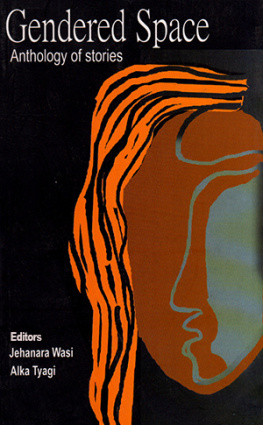
![Rodzher ZHelyazny - Unicorn Variations [Anthology]](/uploads/posts/book/911998/thumbs/rodzher-zhelyazny-unicorn-variations-anthology.jpg)


